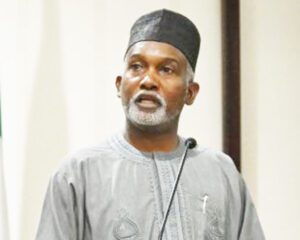FX Volatility: CPPE urges FG to fix macroeconomic, structural environment
The founder, Centre for the Promotion of Private Enterprises (CPPE) Dr Muda Yusuf has urged the Federal Government to fix Nigeria’s structural and macroeconomic environment to control exchange rate volatility and allow businesses to thrive.
He gave the advice in an interview with journalists on Thursday in Lagos.
Yusuf was reacting to the African Export-Import Bank (Afreximbank) signing of a development-focused agreement to provide a $400 million term loan facility to support the financing of Small and Medium Enterprises (SMEs) across Africa.
The loan has a tenor of 10 years and an interest rate of LIBOR + 2 per cent; and it is also a sign of the growing cooperation between China and Africa in support of the African Continental Free Trade Area.
According to him, the loan will have limited impact on Nigerian SMEs.
Yusuf said, “The way forward is for us to prioritise what we need to do for the SMEs; let us fix our macroeconomic environment and our structural environment so that their cost of operations can reduce and the environment can become more predictable.
“The macroeconomic economic environment is a very big issue at this time, there is so much uncertainty and so much volatility in the economy, which has made the purchasing power get weaker by the day.
“If you ask the average business people they would rather that something be done about the macroeconomic environment to stabilise our exchange rate and inflationary environment and to also create an environment where we have better purchasing power for the citizens.
“So, the macroeconomic environment, the structural environment is a bigger issue for many SMEs at this time.”
The CPPE boss also noted that most SMEs, especially those in production had bigger challenges that were beyond the issue of just providing them with money.
He said that they were confronted with challenges around the infrastructure which, according to him, was affecting their cost of production and their capacity to compete, especially with imported products which ironically also come from China.
He said, “I’m not saying that they don’t need money, but even if they take money, it is a loan that they will have to repay.
“If the environment is very difficult for them to operate how will they repay the loan; the risks of defaulting in the payment of the loan is extremely high because of all these issues.’’
Yusuf, therefore, advocated that the money should be given to SMEs in Naira and not in foreign currency to take away currency risks in their repayment.
“Since this loan is in foreign currency, it is extremely very risky for any business to take such a loan especially in an environment like Nigeria where you have exchange rate volatility.
“If they take the loan in dollars, the exchange rate between Naira and dollar which is about 900 or 800 now, by the time they are paying back, it would have been 1,000. How are they going to pay?
“Unless this money will be given to them in Naira, then it can take away the currency risks in their repayment. But, if they are to pay back in hard currency, it’s going to be extremely difficult,’’ he said.
Chairman, Foundation for Economic Research and Training, Prof. Akpan Ekpo, also said that the loan would improve the SMEs capital base, even though the possibility of the money reaching the SMEs in Nigeria would be an issue.
He said, “The deal is a step in the right direction if the issue of accessibility is tackled; because you can sign all these things and access becomes a problem.
“Though, we don’t know the condition but it’s a step in the right direction because it will enhance SMEs’ capital base. With that, they can now focus more on what they want to do.
“ So, if the loan is made easier for the SMEs in Africa and Nigeria in particular to access funds, it will shore up their businesses and the impact will be possible in the long run, issues of funds availability and the exchange rate will be addressed too.”




